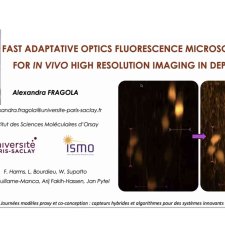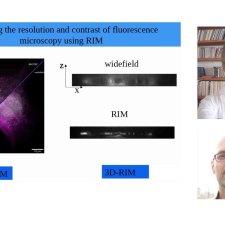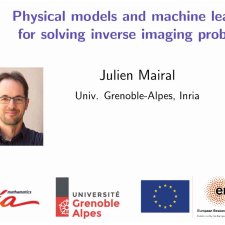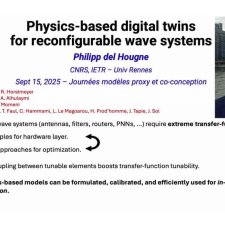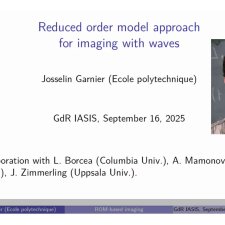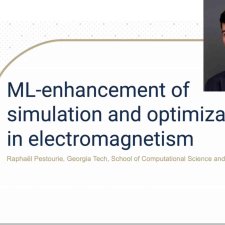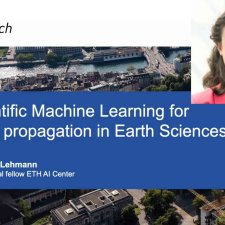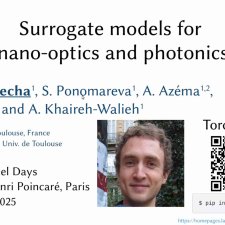Journées 2025 "Modèles proxy et co-conception"
Conférences
Fast adaptive optics fluorescence microscopy for in vivo high resolution imaging in depth
The study of fast biological phenomena at the cellular level has become possible even in depth in biological tissues in several animal models and rodents, thanks to efficient 3D microscopy techniques.
Super-resolved fluorescence microscopy using random illuminations (RIM)
The resolution in optical microscopy is fundamentally constrained by the diffraction limit…
Physical Models and Machine Learning for Scientific Imaging
Deep learning has transformed image processing, often surpassing traditional methods that rely on precise modeling of optical image formation...
Physics-based digital twins for reconfigurable wave systems
Optimizating a reconfigurable wave system (e.g., reconfigurable intelligent surface, dynamic metasurface antenna, physical neural network) for a desired functionality is generally challenging because.
Reduced order model approach for imaging with wave
Dans cet exposé on considère un problème inverse classique lié à l'équation d'onde....
ML-enhancement of simulation and optimization in electromagnetism
Full-wave simulations of large-scale electromagnetic devices — spanning thousands of wavelengths while featuring sub-wavelength geometrical details — pose significant computational challenges….
Des opérateurs de neurones aux modèles de fondation : Scientific Machine Learning pour les phénomèn…
Le Scientific Machine Learning a émergé comme un domaine à la frontière entre apprentissage automatique et simulation numérique pour construire des méta-modèles innovants...
Surrogate models for nano-optics and photonics
Proxy models are becoming increasingly important for data-driven modelling in nano-optics and photonics….
Intervenants
Physicienne. Professeure des universités en physique, Institut des sciences moléculaires d'Orsay (ISMO, UMR 8214), Université Paris-Saclay (2025)
Doctorat en optique (Paris 6, 2003)
Directrice de recherche à l’Institut Fresnel (UMR7249), Aix-Marseille Université dans l’équipe SEMO (Sondage ElectroMagnétique, Optique) (en 2025). - Chargée de recherche à l'Institut Fresnel, au sein des équipes SEMO, Télédétection et Expérimentation Microonde, et CLARTE, Contrôle de la Lumière et Analyse du Rayonnement Traitement Electromagnétique, Université d'Aix-Marseille 3 (en 2018).
Physicien. Directeur de recherche CNRS, membre de l'équipe MOSAIC, Institut Fresnel (UMR 7249), Aix-Marseille université (2025)
Doctorat en Physique du solide (Paris 7, 2002)
Mathématicien, informaticien. Directeur de recherche INRIA, responsable de l'équipe-projet Apprentissage de modèles visuels à partir de données massives (THOT), Centre Inria de l’Université Grenoble Alpes (2024)
Ancien élève de l'École normale supérieure de Cachan. Doctorat en Mathématiques appliquées (Cachan, École normale supérieure, 2010). Habilitation à diriger des recherches en Mathématiques appliquées et informatique (Université Grenoble-Alpes, 2017)
Auteur d'une thèse en Physique. Ondes en milieux complexes à Sorbonne Paris Cité en 2018
Professeur de mathématiques à l'École polytechnique, Centre de mathématiques appliquées (depuis 2016)
Raphaël Pestourie earned his Ph.D. in Applied Mathematics and an AM in Statistics from Harvard University in 2020. Prior to Georgia Tech, he was a postdoctoral associate at MIT Mathematics, where he worked closely with the MIT-IBM Watson AI Lab. Raphaël’s research focuses on scientific machine learning at the intersection of applied mathematics and machine learning and inverse design via scientific machine learning and large-scale electromagnetic design. He is now Assistant Professor in Georgia Tech, USA
Titulaire d'un doctorat en Mécanique des solides et des structures (université Paris-Saclay, 28-06-2024)
Auteur d'une thèse en Nano-physique, nano-composants, nano-mesures à Toulouse 3 en 2016

